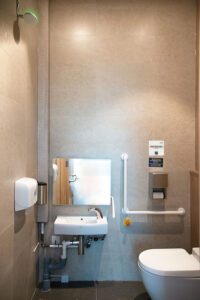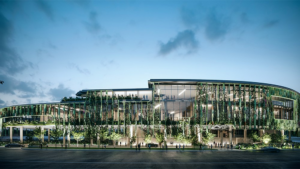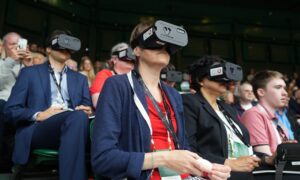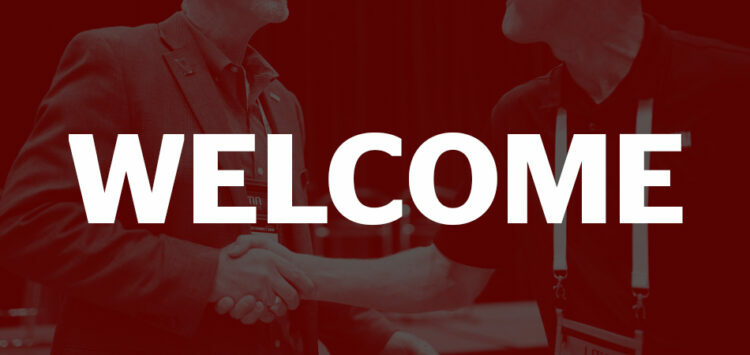Hong Kong Convention and Exhibition Centre to Install AI Life Sense Alert System in 61 Accessible Toilets
By Gloria Fong
Hong Kong Convention and Exhibition Centre (Management) Limited (“HML”) will roll out a new AI Life Sense Alert System in 61 accessible toilets of the Hong Kong Convention and Exhibition Centre (“HKCEC”) to further enhance safety of its visitors. Installation is now being conducted in phases with completion slated for end of July.
HML Managing Director Ms. Monica Lee-Müller, said: “Investing in and applying technology to upgrade  HKCEC’s hardware and software has been a continuous focus of HML. With safety of our visitors being our first and foremost priority, we have taken the precautionary move to introduce the AI Life Sense Alert System so that our staff can provide timely assistance to visitors in distress during an emergency. The key is to reach the visitors in need as soon as possible so as not to miss the golden hour between life and death.”
HKCEC’s hardware and software has been a continuous focus of HML. With safety of our visitors being our first and foremost priority, we have taken the precautionary move to introduce the AI Life Sense Alert System so that our staff can provide timely assistance to visitors in distress during an emergency. The key is to reach the visitors in need as soon as possible so as not to miss the golden hour between life and death.”
The first phase of installation covering 10 accessible toilets has been completed. The installation of the remaining 51 toilets will be completed by end of July. The system can detect a toilet user’s posture (active or static; seated or lying down) and collect motion value for AI-enabled analysis to identify if a fall/accident has taken place or the toilet user has become motionless. In the event of an identified accident, the system will send out an alert within five seconds via hand-held devices such as mobile phones or tablets. Staff will be able to locate the toilet and get there as soon as possible. At the same time, the security control room will also receive the alert to allow for rapid additional manpower deployment. The system will facilitate provision of assistance to visitors in need within the critical life-saving golden timeframe. The AI Life Sense Alert System has already been introduced in public hospitals.
The AI Life Sense Alert System also provides humidity, temperature, and air quality readings, facilitating monitoring of the environment in the accessible toilets and adjustment of cleaning frequency to enhance visitor experience and efficiency.
HML has been pioneering the application of artificial intelligence and robotics to continuously enhance its operations and service. In addition to offering 5G service with 100% coverage of the entire HKCEC, HML has introduced 5G smart security robots and smart cleaning robots – also a green measure in light of its water conservation feature.
Gloria Fong is Head – Corporate & Marketing Communications at the Hong Kong Convention and Exhibition Centre.
Cairns Convention Centre Unveils $176 Million Expansion
From cairnsconvention.com
The $176 million expansion of the Cairns Convention Centre is complete and is about ready to open. With the Cairns Convention Centre you get a winning combination – being in one of the most beautiful destinations in the world, between the Great Barrier Reef and the oldest living rainforest, and what is now one of the most beautiful convention centers in the world.
The expansion adds a rooftop banquet area, outdoor terrace, three flexible meeting rooms, an exhibition  and plenary space in the 10,500 square meters of new floor space, giving the ability to host multiple or larger events with conventions and exhibitions of up to 2,500 guests.
and plenary space in the 10,500 square meters of new floor space, giving the ability to host multiple or larger events with conventions and exhibitions of up to 2,500 guests.
The new Trinity Level offers views of the region’s stunning beauty. The Trinity Room is perfect for galas and large cocktail functions for up to 500 people. The Trinity Terrace wows with views over the Trinity Inlet.
As the popularity of hybrid meetings continue, the Cairns Convention Centre has an array of audio-visual equipment to meet those needs. PTZ cameras are fitted across all meeting spaces, offering pan, tilt, and zoom control features. There are digital lecterns with built-it preview monitors for easy reference to presentation notes. Throughout the centre there are high resolution laser projections in every room, providing bright, crips images for presentations. With the larger spaces there is an opportunity to use a large format screen and projector combination that permits multiple content to be displayed simultaneously.
It’s a myth that Cairns is too small and too far away to host international conferences. Our events get many attendees because we are a bucket list destination. People connect more here as they attend all activities because they are not doing other meetings.
Vodafone Technology Assists Visually Impaired at Wimbledon
From stadiumbusiness.com
New 5G-powered headsets that let visually impaired fans watch live sport were trialled by Vodafone at this year’s Wimbledon tennis championships.
Live footage was streamed from local TV cameras over Vodafone 5G to the GiveVision headsets. They then  enhance the footage to suit the person’s specific sight profile, by bringing it closer to their eye to stimulate the photoreceptor cells in the retina (cells that respond to light), which means a degree of sight can be regained.
enhance the footage to suit the person’s specific sight profile, by bringing it closer to their eye to stimulate the photoreceptor cells in the retina (cells that respond to light), which means a degree of sight can be regained.
It is the first time this 5G technology has ever been used in tennis.
The headsets were trialled for the very first time at Wimbledon by three visually impaired tennis fans.
After a successful trial, Vodafone is exploring the possibility of making the 5G headsets more widely available at future Championships, as well as at other live sporting events across Vodafone partners.
Vodafone’s UK chief commercial officer, Max Taylor, said: “At Vodafone we are committed to using our technology to bring fans closer to the action. Wimbledon is one of the most iconic moments in the British summer calendar, and we are proud to be able to showcase how the power of our 5G network can help make the sport more accessible to people.”
Welcome to Our Newest Members!

Please welcome our newest members who joined IAVM in June 2023. Thank you for being a part of the association! Also, let us get to know you better by participating in the I Am Venue Management series. Please visit here to share your story and photo.
Kate Abbott, Melbourne Convention and Exhibition Centre, South Wharf, VIC, Australia
Cameron Adam, SwiftPOS, Brisbane, QLD, Australia
Nick Addison, Adelaide Oval SMA, North Adelaide, SA, Australia
Louise Adlard, MyState Bank Arena, Glenorchy, TAS, Australia
Helen Alai-Stowers, Platform 4 Group (P4G), Auckland, New Zealand
Alejandro Almeida Lopez, Palacio De Convenciones Zacatecas, Zacatecas, Mexico
Ben Anderson, Arts Centre Melbourne, St Kilda Road, VIC, Australia
Mike Anderson, Netball Queensland Limited, Nathan, QLD, Australia
Matt Andrewartha, MyState Bank Arena, Glenorchy, TAS, Australia
Daniel Andrews, Australian Football League, Docklands, VIC, Australia
Gerardo Apin, Climate Pledge Arena, Seattle, WA
David Ashford, HOTA, Home of the Arts, Gold Coast Mail Centre, QLD, Australia
Meagan Ashurst, University of Houston, Houston, TX
Ricardo Avendano, Expo Tam, Reynosa, Tamps, Mexico
Susan Banks, Certis Security Australia, Sydney, NSW, Australia
Rebecca Barker, Kardinia Park Stadium Trust, Geelong, VIC, Australia
Chris Barling, MI Global Partners, North Sydney, NSW, Australia
Adam Barnes, Reliance Risk, Balnarring, VIC, Australia
Mario Barriga, Centro Internacional De Convenciones De Puerto Vallarta, Puerto Vallarta, Mexico
Emily Bartlett, Melbourne Cricket Club, East Melbourne, VIC, Australia
Mac Beaverstock, First National Bank Arena, State University, AR
Rachel Beck, Netball Queensland Limited, Nathan,QLD, Australia
Ashley Behrens, Southern Aluminum, Magnolia, AR
Patrice Belcher, Bay Venues, Mount Maunganui, New Zealand
Michelle Bell, HOTA, Home of the Arts, Gold Coast Mail Centre, QLD, Australia
William Bell, Zaftech Lighting, Melbourne, VIC, Australia
Paula Benmayor, VenuesLive Management Services, Sydney Olympic Park, NSW, Australia
Lindsay Berckman, Kimmel Center for the Performing Arts, Philadelphia, PA
Dionn Bichel, Brisbane Racing Club Limited, Hamilton Central, QLD, Australia
Warren Black, City of Gold Coast, City of Gold Coast, QLD, Australia
Paola Blancas, Cancun, International Convention Center, Cancun, Mexico
Danielle Bleazby, Melbourne & Olympic Parks Trust, Melbourne, VIC, Australia
Teale Blessington, Netball Queensland Limited, Upper Mount Gravat, QLD, Australia
Jared Bodary, Little Caesars Arena, Detroit, MI
Nicole Bouchier, Meesys Pty Ltd, Burnley, VIC, Australia
Jax Bowman, Alaska Center for the Performing Arts, Anchorage, AK
Damien Boyle, Monash University Performing Arts Centres, Monash University, VIC, Australia
Hannah Boyle, Melbourne Cricket Club, East Melbourne, VIC, Australia
Patrick Boyle, Melbourne Racing Club, Caulfield East, VIC, Australia
Mychael Breedlove, Crypto.com Arena, Los Angeles, CA
Samantha Brennan, Finley Stadium, First Horizon Pavilion, Chattanooga, TN
Mike Brew, Riverside Theatres, Parammatta, NSW, Australia
Amanda Brewer, MyState Bank Arena, Glenorchy, TAS, Australia
Gillian Brewster, Melbourne Sports Centres, Albert Park, VIC, Australia
Tully Briggs, Netball Queensland Limited, Brisbane, QLD, Australia
Jillian Bright, VenuesLive Management Services (NSW) Pty Ltd, Sydney, NSW, Australia
Chad Brimley, Brigham Young University, Provo, UT
Jess Brow, Victoria Racing Club, Flemington,VIC, Australia
Don Brown, Franklin County Convention Facilities Authority, Columbus, OH
Matt Bruskotter, Indiana State Fairgrounds, Indianapolis, IN
Jeffrey Buchanan, Sunshine Coast Council, Bokarina, QLD, Australia
Cristian Buenrostro, Oakland Arena & Oakland-Alameda County Coliseum, Oakland, CA
Nathan Bungey, Marvel Stadium – Melbourne Stadiums Limited, Docklands, VIC, Australia
Chris Bupp, Levy Restaurants, Houston, TX
Chelsea Burdon, MyState Bank Arena, Glenorchy, TAS, Australia
Sue Burnet, Reliance Risk, Gladesville, NSW, Australia
Ashley Butler, Quayclean Australia Pty Ltd, Tullamarine, VIC, Australia
Matt C, Melbourne Sports Centres, Albert Park, VIC, Australia
Mauricio Cacho, Centro Expositor Puebla, Puebla,
Charlotte Cailleaux, Momentus Technologies, Brisbane, QLD, Australia
Renee Camfferman, Adelaide Venue Management, Adelaide, SA, Australia
Lauren Camilleri, Victoria Racing Club, Flemington, VIC, Australia
Bert Campana, Oakland Arena & Oakland-Alameda County Coliseum, Oakland, CA
Tim Carey, Gold Coast Football Club, Carrara, QLD, Australia
Anna Carroll, HOTA, Home of the Arts, Gold Coast Mail Centre, QLD, Australia
Luana Casilli, HBF Stadium, Floreat, WAu, Australia
Victor Castillo, Cintermex Convention Center, Monterrey, Mexico
Monique Catley, San Mateo County Event Center and Fair, San Mateo, CA
Jamie Centofanti, ONE VISUAL, Thornleigh, NSW, Australia
Steph Champion, MAP Co, Melbourne, VIC, Australia
Angela Child, Adelaide Oval SMA, North Adelaide, SA, Australia
Donna Childs, TVS, Atlanta, GA
Tahlia Clark, Accor Stadium, Sydney Olympic Park, NSW, Australia
Jada Collins, Indiana University, Bloomington, IN
Matt Colton, TCU Place, Saskatoon, SK, Canada
Thomas Connolly, HOTA, Home of the Arts, Gold Coast Mail Centre, QLD, Australia
Louis Constantine, Melbourne Sports Centres, Albert Park, VIC, Australia
Adriana Conway, EventPro Software – Australia, Sydney, NSW, Australia
Alsy Cooper, Royal Caribbean Group, Sydney,NSW, Australia
Matt Cooper, Kimmel Center for the Performing Arts, Philadelphia, PA
Nicole Cowdell, Sandy Amphitheater, Sandy, UT
Michelle Coy-Davis, Eclipse Staffing and Security, Indianapolis, IN
Andie Cuttiford, Levy Restaurants, Portland, OR
Salvador de Anda, Foro 13 Aguascalientes, Aguascalientes, Mexico
Caroline de Graaf, Tennessee Performing Arts Center, Nashville, TN
Johnathan Dempsey, Dothan Civic Center & Opera House, Dothan, AL
Tanya Derksen, Kimmel Center for the Performing Arts, Philadelphia, PA
Justin DeSantis, Little Caesars Arena, Detroit, MI
Carin DeVier, Little Caesars Arena, Detroit, MI
Mauricio Diaz Montalvo, Yucatán Siglo XXI Convention Centre, Mérida, Yuc, Mexico
Elizabeth Dreeson, San Francisco War Memorial & Performing Arts Center, San Francisco, CA
Nolan Ducharme, Little Caesars Arena, Detroit, MI
Megan Duffy, Footprint Center, Phoenix, AZ
Alicia Duran, Performing Arts Fort Worth, Fort Worth, TX
Jordan Edmonds, Franklin County Convention Facilities Authority, Columbus, OH
Armando Espinosa, Cintermex Convention Center, Monterrey, Mexico
Karla Estrada, Baja California Center, Tijuana, Mexico
Katie Evans, Climate Pledge Arena, Seattle, WA
Laura Flaherty, Music City Center, Nashville, TN
Joseph Futral, Charleston Gaillard Center, Charleston, SC
Andrea Garcia, Riverside Convention Center, Riverside, CA
Jose Gil, El Paso Live, El Paso, TX
Mark Giles, Legends, Frisco, TX
Elijah Gill, Target Center, Minneapolis, MN
Mike Ginty, Joffe Emergency Services, Santa Monica, CA
Brenda Gomez, Expo Y Foro Imperial/Mundo Imperial/SMG México, Acapulco de Juarez, Mexico
Geronimo Gonzalez, WTC Veracruz, Boca del Rio, Mexico
Travis Grafe-Cline, Omaha Performing Arts, Omaha, NE
Samuel Guerrero, Bryce Jordan Center | Penn State University, University Park, PA
Christopher Hamilton, Levy Restaurants, Houston, TX
Kevin Harp, Dallas Stars Hockey Club, Frisco, TX
Angela Hassell, City of Temple, Texas, Temple, TX
Nancy Hautala, Meany Center for the Performing Arts, Seattle, WA
James Heller, USAE, Inc., Bethesda, MD
Mike Hernandez, City of McAllen: Convention Center/Performing Arts Center, McAllen, TX
Jason Herr, Alaska Center for the Performing Arts, Anchorage, AK
Brian Hetrick, Little Caesars Arena, Detroit, MI
Elena Hurtado, Expo Guadalajara, Guadalajara, Jalisco, Mexico
Thomas Jakobic, Erie Events, Erie, PA
Chris Joffe, Joffe Emergency Services, Santa Monica, CA
Carli Jordan, Alerus Center, Grand Forks, ND
Kayla Joyce, NRG Park, Houston, TX
Tim Judge, Little Caesars Arena, Detroit, MI
Erin Keeling, Alaska Center for the Performing Arts, Anchorage, AK
Milla Khano, San Mateo County Event Center and Fair, San Mateo, CA
Dixon Kirkland, Little Caesars Arena, Detroit, MI
Tom Klep, Erie Events, Erie, PA
Kristina Kourkoulos, The Projects Group, Tampa, FL
Rob Kurz, Oakland Arena & Oakland-Alameda County Coliseum, Oakland, CA
Korey Lamb, Weber State University, Ogden, UT
Michael Lance, Alaska Center for the Performing Arts, Anchorage, AK
Ethan Lang, Baltimore Convention Center, Baltimore, MD
Sam Lankie, CAPS Payroll, Los Angeles, CA
Levi Leitma, Full Sail University, Winter Park, FL
Simon Liu, Oakland Arena & Oakland-Alameda County Coliseum, Oakland, CA
Chris Lobo, Oakland Arena & Oakland-Alameda County Coliseum, Oakland, CA
Emma Logan, San Francisco War Memorial & Performing Arts Center, San Francisco, CA
Sarah Macer, The Lerner Theatre, Elkhart, IN
Robert Mahon, Charleston Gaillard Center, Charleston, SC
John Marsh, Little Caesars Arena, Detroit, MI
Marcus McAlpin, Norton Healthcare Sports & Learning Center, Louisville, KY
Chelsea McDermott, Canadian Tire Centre, Kanata, ON, Canada
Kimberly McGoldrick, Tempe Center for the Arts, Tempe, AZ
Dave McManus, Raleigh Convention and Performing Arts Complex, Raleigh, NC
Alix Mees, Kroenke Sports & Entertainment, Denver, CO
Derek Menchinger, Kalamazoo State Theatre, Kalamazoo, MI
Gustavo Mendoza, Centro De Convenciones Y Exposiciones De Morelia, Morelia, Michoacan, Mexico
Ricardo Mier Reyes, Centro Internacional de Congresos de Yucatan, Mérida, Yucatán, Mexico
Richard Morales, Fort Worth Convention Center, Fort Worth, TX
Brandon Murphy, First National Bank Arena, State University, AR
Caitlin Nowland, Little Caesars Arena, Detroit, MI
Adam Noyes, Proof of the Pudding, Atlanta,GA
Emmanuel Orduno, Henry B. Gonzalez Convention Center, San Antonio, TX
Luis Emilio Ortiz de la Pena, Campeche XXI International Convention and Exhibition Center, Campeche, Mexico
Sarah Ouellet, Century II Performing Arts and Convention Center, Wichita, KS
Ethan Padgett, Ferst Center for the Arts (Georgia Tech), Atlanta, GA
Maggie Parks, Dayton Live, Dayton, OH
Brady Pearce, Hattiesburg Convention Commission, Hattiesburg, MS
Michael Pearson, Oakland Arena & Oakland-Alameda County Coliseum, Oakland, CA
Juan Perez Perez, Centro Cultural y de Convenciones de Oaxaca, Oaxaca, Mexico
Sheneka Perrymond, George R. Brown Convention Center, Houston, TX
Elizabeth Peterson, Minneapolis Convention Center, Minneapolis, MN
Eric Pettis, Portland’5 Centers for the Arts, Portland, OR
Veronica Pheils, Yerba Buena Center for the Arts, San Francisco, CA
Sonia Pina, Yerba Buena Center for the Arts, San Francisco, CA
Camilo Pinzon, Calgary Stampede, Calgary, AB, Canada
Ryan Place, Jerome Schottenstein Center, Columbus, OH
Shane Porter, Alaska Center for the Performing Arts, Anchorage ,AK
Ray Proctor, DISA Global Solutions, Houston, TX
Remington Purnell, Alaska Center for the Performing Arts, Anchorage, AK
Hope Quarles, Alaska Center for the Performing Arts, Anchorage, AK
Patrick Renna, Proof of the Pudding, Atlanta, GA
Gustavo Renteral Lagunes, WTC Veracruz, Boca del Rio, Mexico
David Robbinson, Erie Events, Erie, PA
Christen Robinson, Amalie Arena, Tampa, FL
David Rogers, Oakland Arena & Oakland-Alameda County Coliseum, Oakland, CA
Gonzalo Rosell Ramirez, Centro Internacional de Congresos de Yucatan, Mérida, Yucatán, Mexico
Keith Runk, Baltimore Convention Center, Baltimore, MD
Lorena Safa Serrato, Centro de Convenciones Torreón, Torreon, Coahuila, Mexico
Allyson Samms, City of Kitchener, Kitchener, ON, Canada
Paul Sanelli, Maple Leaf Sports & Entertainment, Scotiabank Arena, Toronto, ON, Canada
Kyle Schackne, TIAA Bank Field & Daily’s Place, Jacksonville, FL
Cody Schaefer, Southern Aluminum, Magnolia, AR
Regina Schapp, Juneau Arts & Humanities Council, Juneau, AK
Phillip Schmiedl, David H. Koch Theater, New York, NY
Jasmin Silva, University of Nevada, Las Vegas, Las Vegas, NV
Katherine Smale, Stormont Vail Events Center, Topeka, KS
Chad Smidt, Tyson Events Center – Oak View Group, Sioux City, IA
Jeff Smith, Los Angeles Auto Show, Los Angeles, CA
Victor Manuel Soler Sobrino, Centro de Convenciones San Luis Potosi, San Luis Potosi, Mexico
Joe Solway, Arup, New York, NY
Guadalupe Soto, Centro Cultural y de Convenciones de Oaxaca, Oaxaca, Mexico
G. Keith Still, University of Suffolk, Burton-in-Kendal, United Kingdom
Randy Sylvester, Northern Quest Resort & Casino, Spokane, WA
Michelle Taboada Barragán, Centro de Convenciones Torreón, Torreon, Coahuila, Mexico
Kalie Taylor, Kroenke Sports & Entertainment, Denver, CO
Joy Tenjeras, Lansing Entertainment & Public Facilities Authority (LEPFA), Lansing, MI
Crystal Tew, TCU Place, Saskatoon, SK, Canada
Alison Thurlow, Erie Events, Erie, PA
Jennifer Tompos, Little Caesars Arena, Detroit, MI
Jeff Townsend, Wings Event Center, Kalamazoo, MI
Eric Van Dervort, Saenger Theatre Pensacola, Pensacola, FL
Yatziry Arahi Vitales Medina, Centro de Convenciones San Luis Potosi, San Luis Potosi, Mexico
Tammy Ward, Oakland Arena & Oakland-Alameda County Coliseum, Oakland, CA
Dirk Weaverling, Midland Horseshoe Arena / Pavilion / Amphitheater, Midland, TX
Evan Wentzel, Oakland Arena & Oakland-Alameda County Coliseum, Oakland, CA
Kelsi Weston, Omaha Performing Arts, Omaha, NE
Sarah Wietecha, Crypto.com Arena, Los Angeles, CA
Beth Wilkinson, Erie Events, Erie, PA
Darrell Willms, Proof of the Pudding, Atlanta, GA
Stacia Winters, Grand Junction Convention Center, Grand Junction, CO
Ben Witte, Proof of the Pudding, Atlanta, GA
Josh Wittmier, Climate Pledge Arena, Seattle, WA
Emily Woodard, Lansing Entertainment & Public Facilities Authority (LEPFA), Lansing, MI
Andrew Young, Oakland Arena & Oakland-Alameda County Coliseum, Oakland, CA
David Zack, Indiana University, Bloomington, IN
Please Take the Time to Complete IAVM’s Demographic Pilot Study
By R.V. Baugus
IAVM member Jill Schinberg, Associate Professor in the Department of Arts Administration at the University of Kentucky, is leading a longitudinal study for IAVM that will provide data for future work on comparative analyses of sectors and regions within the IAVM membership as well as correlative data between demographic variables.
Schinberg has also been working closely with the Diversity and Inclusive Leadership Committee in  brainstorming the various components for this voluntary survey that IAVM members are strongly encouraged to take. Schinberg took some time to talk about the study and expectations that will come from it.
brainstorming the various components for this voluntary survey that IAVM members are strongly encouraged to take. Schinberg took some time to talk about the study and expectations that will come from it.
DESCRIBE WHAT THE STUDY IS.
This study aims to research the demographic makeup of IAVM members over several years. The most common demographic variables most of us encounter in various surveys usually include age, gender, and race or ethnicity. But identity is more complex than those three characteristics. We are also interested in IAVM members’ education and income levels, religious beliefs, native language(s), sexual orientation, disability status, and parental or caregiver responsibilities. Once we’ve collected enough data, we will have a better understanding of who the members of the association are and ultimately, how IAVM can serve them better. The study will officially launch at VC23 in Pittsburgh.
WHY IS THE STUDY BEING CONDUCTED?
IAVM has been conscientious in its efforts to be more inclusive and there are some great examples of that including the creation of the Diversity and Inclusive Leadership Committee (DILC), revisions to the board governance policies, and the distribution of diversity scholarships. Yet, there is currently no systematic way of knowing if initiatives like these have had any effect on the diversity of the membership base. So, by tracking demographic characteristics over time, we will be able to show how our association is becoming more inclusive (or not). Further, if the data show that there are obvious disparities or exclusions, IAVM can use this information to implement targeted initiatives and we‘ll be able to see whether they are effective as the longitudinal study continues.
WHEN WILL THE RESULTS BE KNOWN AND HOW WILL THEY BE SHARED?
The survey will occur once every three years over a twelve-year period. Data collection will end in September each year the survey is conducted. We will share a summary of each survey with IAVM members, and our analysis of the data and its implications will be published in academic journals. We are also prepared to offer webinars or conference sessions to discuss and answer questions about what we’re learning from the data if the board, programming committees, or members request it. Actually, this seems like a good time to say that everything about this study is anonymous. So, if you choose to participate (and we hope you do) your personal data will not be identifiable or shared–not even to the researchers.
HOW WILL IAVM MEMBERS BENEFIT?
According to the Greater Good Science Center at the University of California-Berkeley, “Diversity enhances creativity. It encourages the search for novel information and perspectives, leading to better decision making and problem solving.” In addition to the positive effects a diverse population can have in life and work, a more diverse IAVM member base is the first hurdle to a more inclusive association. And for our colleagues who might be members of historically underrepresented communities, a more inclusive association helps to reinforce the message that they belong.
You can help ensure that IAVM measures up to this task by taking the survey. Come see us in the IAVM education booth at VenueConnect for more information. Take the survey now by clicking here.
Do you want to receive a Front Row News weekly digest?
Categories
- Allied (856)
- Architecture (147)
- Arenas (744)
- Career (890)
- Convention Centers (889)
- Education (608)
- Events (1,528)
- Food & Beverage (193)
- Foundation (113)
- Guest Experience (1,482)
- Industry News (2,253)
- Leadership (1,872)
- Marketing (150)
- Membership (1,985)
- Music (212)
- Performing Arts Centers (453)
- Professional Development (398)
- Research (127)
- Safety & Security (425)
- Sports (763)
- Stadiums (607)
- Student (159)
- Technology (515)
- Ticketing (92)
- Touring (82)
- Trends (357)
- Uncategorized (771)
- Universities (216)
- Video (25)
- Young Professional (198)
Twitter Feed
- Twitter feed loading
Recent Posts
- GEODIS Park Selects Allied Universal As Its Preferred Event Services Provider
- Venuworks Appoints Marc Solis as Executive Director of the Fresno Convention and Entertainment Center
- Los Angeles Convention Center Diverts 8,000 Pounds of Wood Waste to Local Foundation Supporting Fire Victims
- Fort Worth Unveils Plans for Phase 2 of Convention Center Transformation
- San Diego Convention Center CEO Announces Retirement After a Decade of Leadership
Categories
- Allied
- Architecture
- Arenas
- Career
- Convention Centers
- Education
- Events
- Food & Beverage
- Foundation
- Guest Experience
- Industry News
- Leadership
- Marketing
- Membership
- Music
- Performing Arts Centers
- Professional Development
- Research
- Safety & Security
- Sports
- Stadiums
- Student
- Technology
- Ticketing
- Touring
- Trends
- Uncategorized
- Universities
- Video
- Young Professional
Archives
- February 2026
- January 2026
- December 2025
- November 2025
- October 2025
- September 2025
- August 2025
- July 2025
- June 2025
- May 2025
- April 2025
- March 2025
- February 2025
- January 2025
- December 2024
- November 2024
- October 2024
- September 2024
- August 2024
- July 2024
- June 2024
- May 2024
- April 2024
- March 2024
- February 2024
- January 2024
- December 2023
- November 2023
- October 2023
- September 2023
- August 2023
- July 2023
- June 2023
- May 2023
- April 2023
- March 2023
- February 2023
- January 2023
- December 2022
- November 2022
- October 2022
- September 2022
- August 2022
- July 2022
- June 2022
- May 2022
- April 2022
- March 2022
- February 2022
- January 2022
- December 2021
- November 2021
- October 2021
- September 2021
- August 2021
- July 2021
- June 2021
- May 2021
- April 2021
- March 2021
- February 2021
- January 2021
- December 2020
- November 2020
- October 2020
- September 2020
- August 2020
- July 2020
- June 2020
- May 2020
- April 2020
- March 2020
- February 2020
- January 2020
- December 2019
- November 2019
- October 2019
- September 2019
- August 2019
- July 2019
- June 2019
- May 2019
- April 2019
- March 2019
- February 2019
- January 2019
- December 2018
- November 2018
- October 2018
- September 2018
- August 2018
- July 2018
- June 2018
- May 2018
- April 2018
- March 2018
- February 2018
- January 2018
- December 2017
- November 2017
- October 2017
- September 2017
- August 2017
- July 2017
- June 2017
- May 2017
- April 2017
- March 2017
- February 2017
- January 2017
- December 2016
- November 2016
- October 2016
- September 2016
- August 2016
- July 2016
- June 2016
- May 2016
- April 2016
- March 2016
- February 2016
- January 2016
- December 2015
- November 2015
- October 2015
- September 2015
- August 2015
- July 2015
- June 2015
- May 2015
- April 2015
- March 2015
- February 2015
- January 2015
- December 2014
- November 2014
- October 2014
- September 2014
- August 2014
- July 2014
- June 2014
- May 2014
- April 2014
- March 2014
- February 2014
- January 2014
- December 2013
- November 2013
- October 2013
- September 2013
- August 2013
- July 2013
- June 2013
- May 2013
- April 2013
- March 2013
- February 2013
- January 2013
- May 2012
- March 2012
- December 2011
- November 2011
- October 2011
Recent Comments
- Frank Bradshaw, Ph.D., CVE on John Meyer, CVE, a Tireless Advocate of Certification for Venue Professionals, Has Died
- Neil Sulkes on Hilary Hartung, Friend to Many in Venue Marketing, Has Left Us
- Jason Parker, CVE on The Devastation of Hurricane Helene and How We Can Support One Another
- Larry Perkins on Touhey Testifies Against Speculative Ticketing Before Congressional Subcommittee
- Peter Secord on Major Players for Planned Elkhart Amphitheater Were in the Mix at VenueConnect
